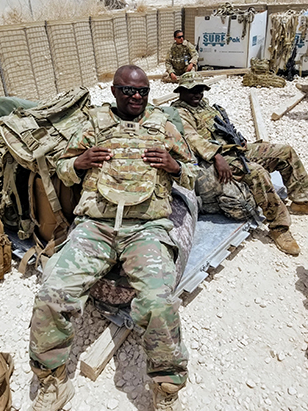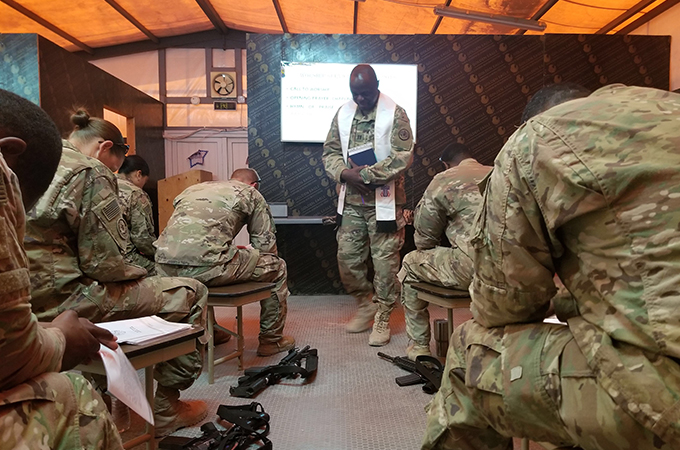In his ministry, there is the familiar scene of men and women, heads bowed in prayer. What’s different is that Captain Patrice Mbo '18 (D.A.P.S.) and his congregants are in army fatigues. The chapel is a military-grade tent, and on the ground, at their feet, lay their weapons.
While Mbo’s arrival in Syria by way of France, Cameroon, and the U.S. Army may seem a most unusual path, it’s as if his whole life led to this work for which he is uniquely qualified. His journey began even before birth, when his parents left Cameroon so his father could attend San Francisco Theological Seminary (SFTS) on scholarship. Alhough Mbo, the youngest of seven, was born after his family left the U.S., the experience left an indelible impression. Says Mbo, “I grew up thinking of SFTS as a dream.”
Mbo spent his early years, until age ten, in France before returning to Cameroon. Following in his grandfather’s and father’s example, Mbo entered seminary. But this is where his path diverges. In 2004, Mbo’s life was threatened. Remaining in Cameroon became unsafe, and, with no alternative, he fled to the U.S., reluctantly leaving behind his pregnant wife. Mbo filed for asylum and settled in Menlo Park, California, where the community embraced him and provided the legal and logistical support to petition for his wife’s immigration. After an agonizing three-years, Mbo was reunited with his wife and son. Astonishingly, Mbo’s recollections of that time are not about challenges, but of blessings: the supportive community and the family that now surrounds him—his wife and five children.
Through a commitment to serve, Mbo honors those who came to his aid. “I wanted to give back after my experience because of how much love I received,” he says. Leaving Cameroon, he says, “I had no plan to go to seminary.” But plans changed. In 2008, Mbo applied to SFTS—now part of the Graduate School of Theology at the University of Redlands—to pursue advanced pastoral studies and finish his doctoral degree. Around this time, he volunteered as a military chaplain. Recognizing Mbo’s skill set, his supervisor recommended he pursue a career as an Army chaplain.

By December 2012, Mbo had become an active Army chaplain with the Third Cavalry Infantry Regiment, one of the Army’s oldest. Army chaplains, Mbo explains, care for soldiers at all times. “They are strong ... but sometimes need to be reminded that what they are doing is meaningful.” They come from diverse backgrounds and many young soldiers are still discovering who they are. Mbo understands this. His ministry is surely informed by his own experience in Cameroon, a nation with rich cultural diversity. He asserts, too, because of his reform background, “I’m not trying to do everything by myself, but inviting everyone to be a part of the service—everyone is included. Someone can play the guitar, someone can pray, because everyone comes from a different background.”
The work is intense. Combat stress sometimes awakens a person’s past traumas that need processing. Soldiers also need support for the difficult transition into family and civilian life, where the pace and expectations are strikingly different. Mbo credits SFTS, especially what he learned from Rev. Scott Clark, for learning how to be “present and open to others ... without inserting myself.” What he learned at SFTS “just kicks in when you are there. Soldiers talk about a crisis back home with their spouse or they are ‘losing it’ from being away. These skills are very, very helpful in understanding what is going on with soldiers and for being able to help them.” He is there, he explains, to support soldiers to “walk their own journey.”
Mbo finds ministry to soldiers rewarding. “Soldiers are the best. They talk about anything. They have a lot to process, and, sometimes, you have to cry with them. Everyone wants happy times, too,” he says. And for that, there are celebrations. Most profoundly, in this place where the chapel structure is temporary and services can take place anywhere, Mbo is making a positive, lasting impact. The impermanence of structure bows to the permanence of spirit.
Learn more about the U of R Graduate School of Theology, home of the San Francisco Theological Seminary.
Editor's Note: This article is an edited version of pieces that ran in SFTS's Chimes magazine.






